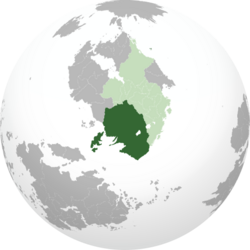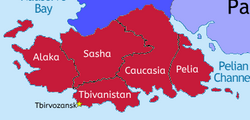South Sakartvelos
South Sakartvelos, officially known as The Democratic Republic of South Sakartvelos, is a country located in the continent of Sarpedon. Following a fierce conflict against Soviet Yoshilandia, South Sakartvelos achieved independence on October 14, 2031. The country is characterized by its unique blend of democratic communism, where the economic system is based on communism, but leaders are democratically elected. Led by President Makvala Gelashvili, South Sakartvelos is divided into five provinces: Pelia, Caucasia, Sasha, Tbivanistan, and Alaka. The capital city, Tbirvozansk, located in Tbivanistan, serves as the country's political and cultural hub.
The Democratic Republic of South Sakartvelos Демократическая Республика Южный Сакартвелос (Russian) | |
|---|---|
Motto: Наша страна превосходит всех, кто посмеет приблизиться к тому, чтобы покончить с ней. ("Our country is superior to all who dare come close to ending it.") | |
 Location of South Sakartvelos (need map...) Inferior Lands (gray) | |
 | |
| Capital | Tbirvozansk |
| Largest city | Your largest city (type "capital" for it to say "Capital and largest city") |
| Official languages | Russian |
| Religion | Orthodox Christianity |
| Demonym(s) | Georgian (noun) Sakartvelosian (adjective) |
| Government | Communist Democracy |
• President | Makvala Gelashvili |
• Speaker of the Senate | Ambrosi Giorgadze |
| Congress | |
| There is no lower house | |
| Establishment | |
• Independence of South Sakartvelos | 14/10/2031 |
| Population | |
• Estimate | 9,221,618 (2031) |
• Census | 9,219,542 (2030) |
| GDP (nominal) | estimate |
• Total | Your GDP = $361,321,436,476 |
• Per capita | $39,182 |
| Gini | 0.3 low |
| Currency | Siberian ruble (δ) (SBR) |
| Driving side | right |
| Calling code | +724 |
| Internet TLD | .skv |
South Sakartvelos boasts a diverse political landscape, with three prominent political parties shaping its governance. The Communist Pact holds the majority in Congress with 89 out of 100 seats, including the presidency and the speaker of Congress. The Socialist Forward party commands seven seats, while the Liberal Party occupies three seats. Additionally, there is an independent representative in Congress. Legislation is formulated in the Supreme Court, underscoring the country's unique political structure.
The country's rich cultural heritage is rooted in its Slavic population, with Russian being the official language alongside Ukrainian, Georgian, and Serbian, which are also widely spoken. Christianity, particularly the Orthodox denomination, serves as the official state religion, although religious adherence is not mandatory. South Sakartvelos holds Dogs in high regard, symbolizing qualities of loyalty and bravery, while the hammer and sickle emblem represents communism, general equality, and the military. The nation thrives in three major industries: Arms Manufacturing, Information Technology, and Fishing. It demonstrates a commitment to sustainability, with 73% of its energy deriving from renewable sources, primarily hydroelectric power, due to its abundant rivers. Moreover, the country's efficient transportation network, encompassing railroads, buses, and ports, facilitates easy travel and connectivity throughout the nation. The GDP in Siberian Rubles is δ451,651,795,595 and the GDP/capita is δ48,977. South Sakartvelos is a member of the League of Nations.
Etymology
Why is your country called what it is? What is the source of that word or phrase?
History
What is a general overview of your country's path through history?
First era
How was your country originally settled?
Second era
What were the first political structures of your country? Did it have any very early rivals or was it controlled by a foreign country?
Third era
What were your country's first major moves on an international level?
Fourth era
Did your country ever have a period of significant decline or internal struggle?
Fifth era
Was your country subject to imperialism later in its life, or was it an imperial power?
Sixth era
How did the 20th century affect your country?
Geography
-
First lovely location
-
Second lovely location
-
Third lovely location
-
Fourth lovely location
-
Fifth lovely location
-
Sixth lovely location
What is the general explanation of how your country exists within the world?
Climate and environment
Is your country hot or cold?
Government and Politics
How is your country ruled or governed?
Executive
Who is responsible for making high level choices in your country? Does it have a President or King?
Legislative
Who decides the laws for your country? Is there political parties and a legislature?
Federal subdivisions
How is your country divided? Are there states or provinces, or is the country directly governed from the capital as a unitary state?
Politics
What political factions exist? Who has ruled predominantly?
Law
What kind of laws and legal system does your country employ?
Demographics
What kind of people live in your country?
Ethnicity
What ethnic groups make up your country?
Language
What language or languages do your country's people use? Are there any previously used languages no longer common? Are these languages native to your country or shared with another?
Religion
Religious affiliations in the XXX (20XX)
What do your country's people believe in religiously, if anything? How many groups are there?
Education
How many people in your country are educated?
Culture and Society
What do your people do, and what are they like?
Education
What is your country's education system like? How do the schools work? What do people think about education?
Attitudes and worldview
How do your country's people view life?
Kinship and family
How are families or kinship groups structured in your country?
Cuisine
What do your people eat?
Religion
What do your people believe? Rather than demographics, as above, think about how important religion is to your people and their view about their own and other religions. What is the relationship between the prevailing view and minority religious groups? Is it an official religion, and do any laws exist about free worship?
Arts and Literature
What type of art do your people make? Do they have a tradition of painted art, well-crafted television shows, or great music?
Sports
Does your country have any major sports leagues? What types of sports are played, both professionally and for fun by your country's people?"
Symbols
Are there any prominent symbols which are well known to represent your country?
Economy and Infrastructure
How does your country's economy work?
Industries and Sectors
What are the largest parts of your economy in terms of what they do?
Currency
What exchange systems are used within your country's economy?
Healthcare
How do people in your country procure medical care? How is it paid for?
Labor
How is labor organized within your country? Are there any social institutions or unions which deal with labor concerns?
Transportation
How do people in your country get around? Is there a major highway system as well as sea- and airports?
Energy
What type of energy keeps your nation going? Are you renewable or use fossil fuels, and if you are renewable, how recently did your country transition?
Technology
How advanced is your country? Is it an innovator, or does it largely import new developments?
Military
How large is your country's military? Is it large but poorly equipped or small and elite? Does your country have a martial tradition?

